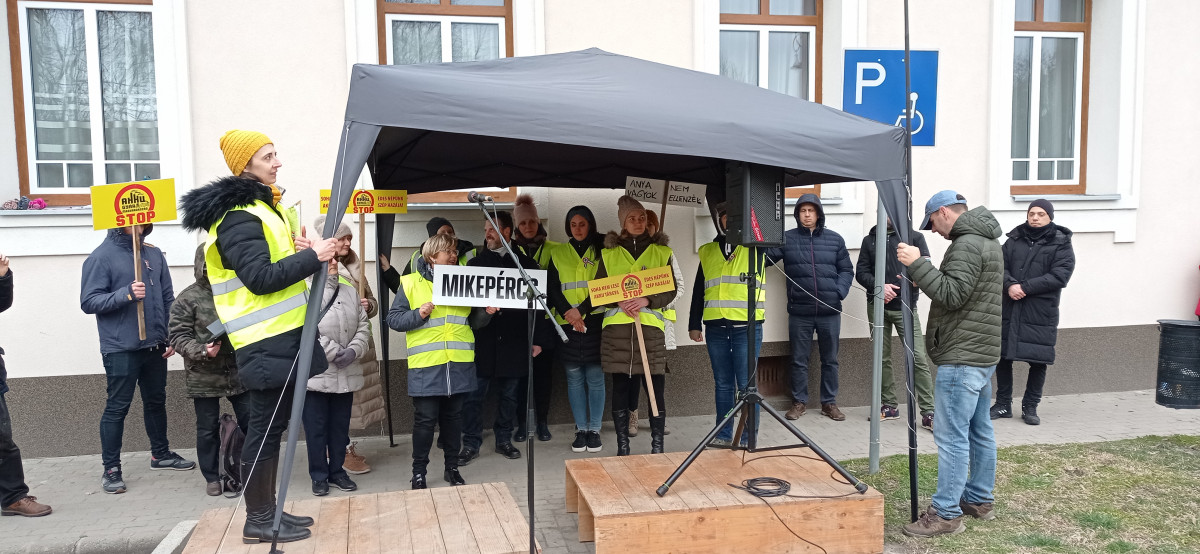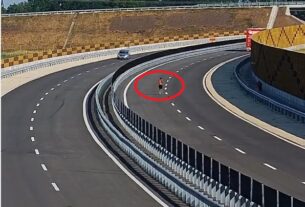The Mikepércs Mothers for the Environment Association (MIAKÖ) wrote to Maroš Šefčovič to get help in their fight against the planned battery factory(s) nearby their homes. The organization informed the new vice-president of the European Commission that the European Union’s green transition regulations being developed are in line with our commitment to protect the environment and the health of our children and grandchildren.
“We also believe that we are all responsible and cannot leave our environment in this state, whether we are citizens or political decision-makers. We also welcome your insight that it is necessary to involve people to a greater extent in decisions that can significantly affect the state of their environment, as an agreement has already been reached between the member states. Furthermore, the Aarhus Convention serves this purpose, the guidelines of which should be enforced to a greater extent” – can be read in the mothers’ letter.
The organization discusses at length the struggles against the battery factory of the company CATL, which is being built on the border of Debrecen and Mikepércs, and makes a proposal in this regard: “It is recommended to examine the safety distance of dangerous industrial facilities when developing European Union regulations, in order to determine a mandatory safety distance from residential buildings, public institutions, other industrial facilities, transport hubs or even an airport in order to prevent mass endangerment of the population or a domino effect industrial disasters can be avoided.”
They recall the battery factory public hearings, where they were faced with a cold shower with the three plants planned to be established in the area. As a reminder, experts also participated in the public hearing and confirmed the information that these are industrial facilities that require an extremely large amount of energy and drinking-quality water, and will cause a lot of noise and air pollution if they are put into operation. “Unfortunately, the political leaders decided to build these factories without informing the public beforehand. Although the mandatory public hearings were held, people did not know what consequences they had to expect and this issue did not receive enough attention. The municipality did not draw people’s attention to these important events either, they only learned about them by accident” – reads the letter.
They write about the public hearings in Debrecen, which caused huge opposition and media coverage, the rejected referendum initiatives and the lack of information to the population. “We recommend that when the European Union regulations are developed, the holding of public hearings in the physical presence of people in sufficient time – before the decision on the investment – is made and is widely announced. Questions asked at the public hearing must be answered orally and in writing by the competent authorities in such a way that it is accessible, detailed and understandable to everyone” – MIAKÖ proposes.
The vice-president is also informed that the organization is struggling to provide people with unbiased information supported by expert opinions instead of the government and local governments, but due to the lack of adequate resources, they cannot do this as efficiently as the government, which controls the public media manually, and whose opinion deliberately misinforms the residents. As they write, it is an additional disadvantage for the organization that our activities are presented in the public media and in print media supported by the government with public money and on Internet forums as if they were under opposition or political influence, and that the protest against the battery industry is “anti-national” because it is foreign supported financially by lobbies from abroad.
“It is also recommended to touch this area when developing European Union regulations. The political leadership of the member states should be obliged to involve citizens in decisions about the industry that burdens the environment in such a significant way in a timely manner, with impartial and expert information. It is necessary to amend the regulations that prevent the effective operation of environmental protection organizations in order to ensure that the protection of interests and expert information is carried out from multiple sources and in a timely manner” – formulate the new proposal.
The mothers also feel it necessary to define that the basic rights of people come before the basic rights of the owners of the factories that burden their immediate environment, as entrepreneurs. If it is unavoidable that the factories are installed near populated areas, mandatory public information and the holding of a successful referendum should be the minimum conditions for starting the licensing procedures. In the letter, the new vice-president’s attention is also drawn to the fact that there is a labor shortage in Hungary, and raw materials will have to be transported to the factories from abroad, over long distances. They declare: in our region, the installation of even a single battery factory poses a major risk for citizens and from the point of view of investors.
They also write about the fact that the city of Debrecen was unable to present to them the municipal environmental protection program defined in the relevant environmental protection law. Unfortunately, they only had such a program for the period between 2009-14, which was revised in 2015, but they could not show the program for the coming years, approved by the general assembly and coordinated with the surrounding settlements.
“According to the environmental protection law, in order to protect the environment, Debrecen must cooperate with other authorities performing environmental protection tasks, other municipalities, and associations, which, according to the documents sent, is incomplete and did not happen in most cases. Mikepércs, on the border of which the largest battery and cathode factory is being built, only learned about the industrialization plans of the city of Debrecen from the press” – they write, adding that the environmental protection law also obliges Debrecen to send the drafts of its decrees and decisions concerning environmental protection, as well as the drafts of its plans concerning the state of the environment, especially the environmental protection program, for information to the neighboring and affected municipalities, and to the competent environmental protection administrative bodies for comments and which bodies formulate a professional opinion on this. The municipality did not fulfill this obligation either.
Related suggestion: In order to avoid similar cases, a coordinated environmental protection plan is required, which is provided to the population of the affected settlements in the form of information, before decisions on battery industry investments are made in the European Union regulations. We recommend that the environmental impact of industrial facilities operating or planned within the administrative boundaries of the settlements be taken into account when creating settlement environmental protection programs. In order to prevent this regulation from being circumvented, it is recommended that the European Union member states be required to apply the above regulations to industrial parks declared as special economic zones, so that residents living near industrial parks cannot be disadvantaged in the exercise of their basic rights. According to the organization, in the case of already operating factories, there are many illegal operations that endanger the environment and the health of those working there and those living in the vicinity. The authorities are powerless, paying the Hungarian fines to the giant companies is not a problem.
“We ask for the legislative intervention of the European Union’s decision-makers so that these factories can be forced to operate legally. Please make a binding regulation for the member states so that fines can be imposed on a similar principle and scale, as, for example, the General Data Protection Regulation of the European Union (Regulation 2016/679), according to the GDPR, where in the case of personal data violations, the fines that can be imposed are all must be effective, proportionate and dissuasive. In the event of a GDPR violation, an administrative fine of up to EUR 10 million can be imposed, or in the case of businesses, the business can be fined up to 2% of the total annual global market turnover of the previous financial year, with the higher of the two amounts being imposed” – read in the letter of the Mothers of Mikepércsi a Környezetért Egyesület (MIAKÖ).
According to the mothers, it would be necessary to introduce a system of fines, which is binding on all member states and contained in a regulation, also in the case of violations of the law of the operation of seriously polluting and dangerous battery factories. It is also recommended that the European Union establish an EU institutional system based on the model of the authorities acting in case of violations of the GDPR, which would be able to apply effective monitoring and sanctioning practices to polluting industrial plants operating in the entire territory of the Union, acting along the lines of common EU rules.
debreceninap.hu

















